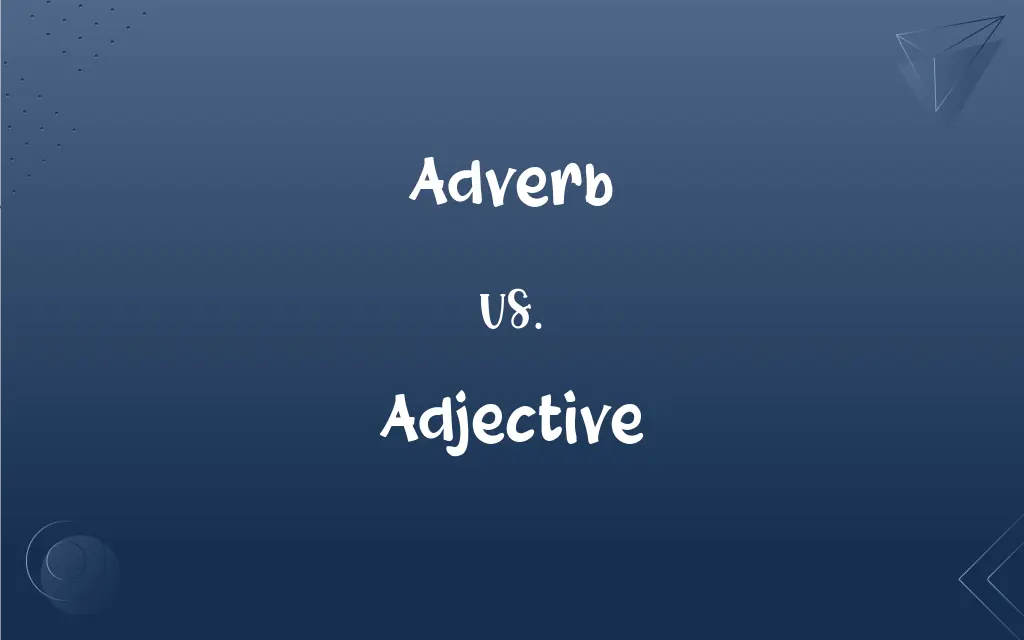Adverb vs. Adjective: What's the Difference?
Edited by Harlon Moss || By Janet White || Published on November 11, 2023
Adverbs modify verbs, adjectives, or other adverbs, often answering how, when, or where; adjectives modify nouns, indicating attributes or qualities.

Key Differences
Adverbs and adjectives are essential components in the English language. An adverb, as the name suggests, adds to the meaning of a verb, adjective, or another adverb. It often describes how, when, where, or to what extent an action is performed. For instance, in the sentence "She ran quickly," "quickly" is the adverb describing how she ran.
Adjectives, on the other hand, provide more information about nouns. They answer questions like what kind, which one, or how many. Adjectives essentially provide attributes or characteristics of the nouns they modify. For example, in the sentence "She wore a beautiful dress," "beautiful" is the adjective describing the dress.
While both adverbs and adjectives provide more detail to sentences, their functions differ significantly. Adverbs can be found in various places within a sentence depending on what they are modifying. For instance, "She quickly ran" or "She ran quickly" are both correct placements for the adverb. However, adjectives typically come before the noun they modify, like "red apple" or "tall tree."
It's also worth noting that some words can serve as both adverbs and adjectives depending on the context. For example, "fast" can be an adjective as in "a fast car" or an adverb as in "he runs fast." However, the fundamental distinction remains: adverbs modify actions or other modifiers, while adjectives modify nouns.
Another critical distinction is that many adverbs are formed by adding "-ly" to adjectives. For example, "beautiful" (adjective) becomes "beautifully" (adverb). But there are exceptions and not all adverbs end in "-ly," nor do all adjectives form adverbs this way.
ADVERTISEMENT
Comparison Chart
Function
Modifies verbs, adjectives, and other adverbs
Modifies nouns
Answers
How, when, where, to what extent
What kind, which one, how many
Examples
Quickly, beautifully, soon
Beautiful, red, tall
Position
Can vary in a sentence
Typically before the noun
Formation
Often by adding "-ly" to adjectives
Not formed from other word types
ADVERTISEMENT
Adverb and Adjective Definitions
Adverb
Adverbs describe how actions are performed.
She danced gracefully.
Adjective
Adjectives describe the characteristics of nouns.
The sky is blue.
Adverb
Adverbs show the degree or extent of an action.
He almost finished the race.
Adjective
Adjectives point out which one.
This apple is ripe.
Adverb
Adverbs indicate where something happens.
She looked everywhere.
Adjective
Adjectives specify the quantity or amount.
She has many books.
Adverb
Adverbs specify when an action occurs.
He always arrives on time.
Adjective
Adjectives express feelings or emotions.
The news was surprising.
Adverb
The part of speech that modifies a verb, an adjective, another adverb, or an entire clause or sentence.
Adjective
The part of speech that modifies a noun or other substantive by limiting, qualifying, or specifying and distinguished in English morphologically by one of several suffixes, such as -able, -ous, -er, and -est, or syntactically by position directly preceding a noun or nominal phrase.
Adverb
Any of the words belonging to this part of speech, such as so, very, and rapidly.
Adjective
Any of the words belonging to this part of speech, such as white in the phrase a white house.
Adverb
(grammar) A word that modifies a verb, adjective, other adverbs, or various other types of words, phrases, or clauses.
Adjective
Adjectival
An adjective clause.
Adverb
(programming) In the Raku programming language, a named parameter that modifies the behavior of a routine.
Adjective
(Law) Specifying the processes by which rights are enforced, as opposed to the establishing of such rights; remedial
Adjective law.
Adverb
(rare) To make into or become an adverb.
Adjective
Not standing alone; derivative or dependent.
Adverb
A word used to modify the sense of a verb, participle, adjective, or other adverb, and usually placed near it; as, he writes well; paper extremely white.
Adjective
(grammar) A word that modifies a noun or noun phrase or describes a noun’s referent.
The words “big” and “heavy” are English adjectives.
Adverb
The word class that qualifies verbs or clauses
Adjective
(obsolete) A dependent; an accessory.
Adverb
A word that modifies something other than a noun
Adjective
(grammar) Adjectival; pertaining to or functioning as an adjective.
Adverb
Adverbs modify adjectives.
The cake is incredibly tasty.
Adjective
(legal) Applying to methods of enforcement and rules of procedure.
Adjective
Needing the use of a mordant to be made fast to that which is being dyed.
Adjective
Incapable of independent function.
Adjective
(transitive) To make an adjective of; to form or convert into an adjective.
Adjective
To characterize with an adjective; to describe by using an adjective.
Adjective
Added to a substantive as an attribute; of the nature of an adjunct; as, an adjective word or sentence.
Adjective
Not standing by itself; dependent.
Adjective
Relating to procedure.
Adjective
A word used with a noun, or substantive, to express a quality of the thing named, or something attributed to it, or to limit or define it, or to specify or describe a thing, as distinct from something else. Thus, in phrase, "a wise ruler," wise is the adjective, expressing a property of ruler.
Adjective
A dependent; an accessory.
Adjective
To make an adjective of; to form or change into an adjective.
Language has as much occasion to adjective the distinct signification of the verb, and to adjective also the mood, as it has to adjective time. It has . . . adjectived all three.
Adjective
A word that expresses an attribute of something
Adjective
The word class that qualifies nouns
Adjective
Of or relating to or functioning as an adjective;
Adjectival syntax
An adjective clause
Adjective
Applying to methods of enforcement and rules of procedure;
Adjective law
Adjective
Adjectives compare two nouns.
He is taller than his brother.
FAQs
What question can an adjective answer about a noun?
Adjectives can answer questions like what kind, which one, or how many.
What do adjectives modify?
Adjectives modify nouns.
How are many adverbs formed?
Many adverbs are formed by adding "-ly" to adjectives.
Are all words ending in "-ly" adverbs?
No, not all "-ly" words are adverbs, and not all adverbs end in "-ly."
Can an adverb answer the question "how"?
Yes, adverbs often describe how an action is performed.
What's an example of an adverb modifying an adjective?
In "incredibly beautiful," "incredibly" is an adverb modifying the adjective "beautiful."
What do adverbs modify?
Adverbs modify verbs, adjectives, or other adverbs.
Where do adjectives typically appear in relation to the noun?
Adjectives typically come before the noun they modify.
How can you identify an adverb in a sentence?
Look for words that modify verbs, adjectives, or other adverbs and often answer how, when, or where.
Can adverbs show frequency?
Yes, adverbs can indicate frequency, like "always" or "rarely."
Can adverbs also modify other adverbs?
Yes, adverbs can modify other adverbs, like "very quickly."
Can the same word be used as both an adverb and an adjective?
Yes, words like "fast" can be both, depending on their usage in a sentence.
Can words be both adverbs and adjectives?
Yes, some words can serve as both, depending on context.
Do adjectives always come before nouns?
While adjectives typically precede nouns, in some poetic or stylized expressions, they might follow the noun.
What role do adjectives play in language?
Adjectives provide descriptive detail, making language more vivid and specific.
How do adverbs enhance language?
Adverbs add depth to actions, giving more context and clarity to how, when, or where something happens.
Do adjectives change forms like verbs?
Some adjectives have comparative and superlative forms, like "big, bigger, biggest."
Are there exceptions to the typical placements of adverbs and adjectives?
Yes, while there are general rules, stylistic choices or specific constructions can lead to variations in placement.
How can one differentiate between an adverb and an adjective in a sentence?
Check what the word is modifying: if it's a noun, it's likely an adjective; if it's a verb, adjective, or another adverb, it's probably an adverb.
Are there adverbs that don't modify anything?
Some adverbs, like "perhaps" or "maybe," can stand alone to convey uncertainty.
About Author
Written by
Janet WhiteJanet White has been an esteemed writer and blogger for Difference Wiki. Holding a Master's degree in Science and Medical Journalism from the prestigious Boston University, she has consistently demonstrated her expertise and passion for her field. When she's not immersed in her work, Janet relishes her time exercising, delving into a good book, and cherishing moments with friends and family.
Edited by
Harlon MossHarlon is a seasoned quality moderator and accomplished content writer for Difference Wiki. An alumnus of the prestigious University of California, he earned his degree in Computer Science. Leveraging his academic background, Harlon brings a meticulous and informed perspective to his work, ensuring content accuracy and excellence.

































































